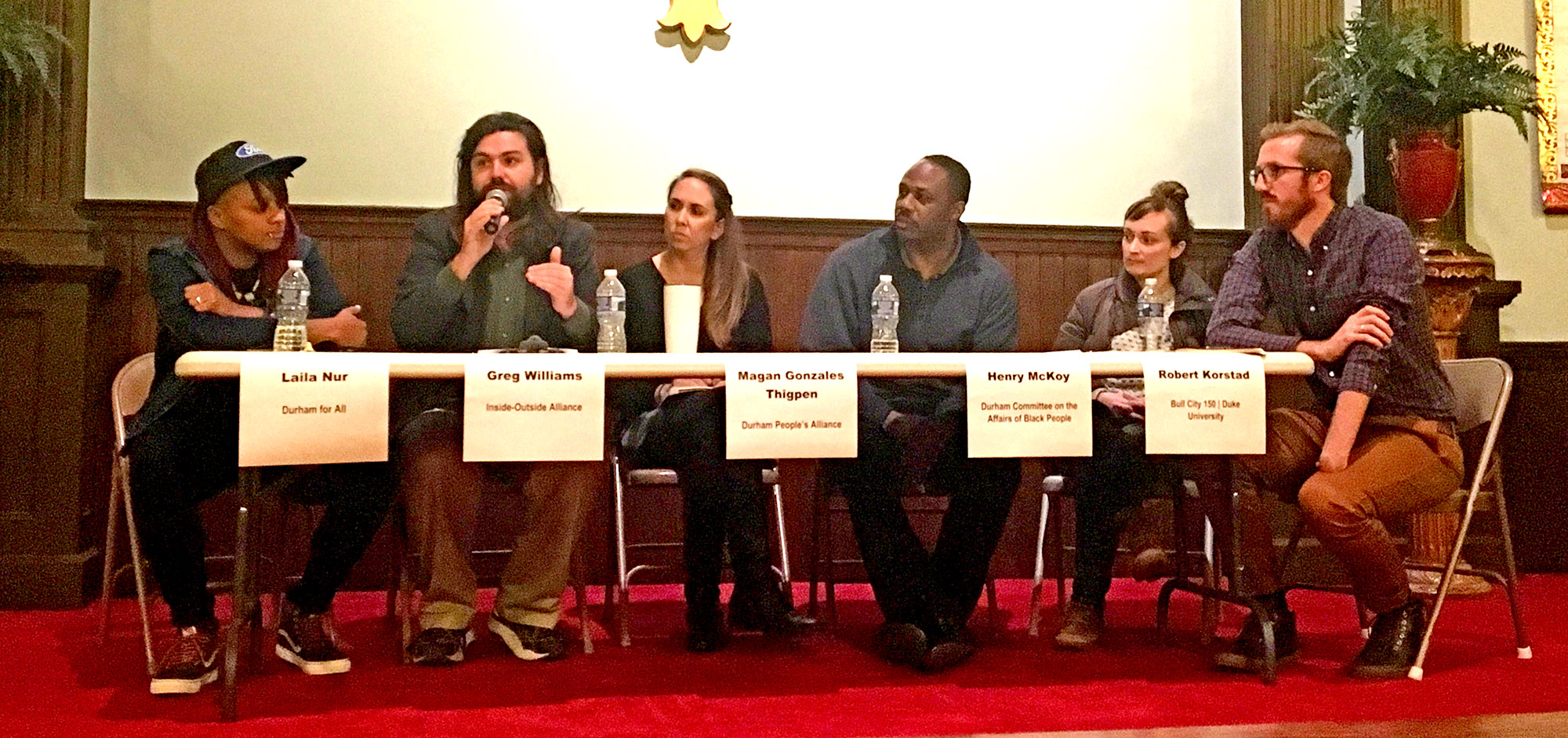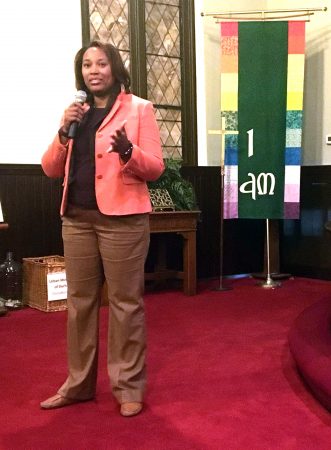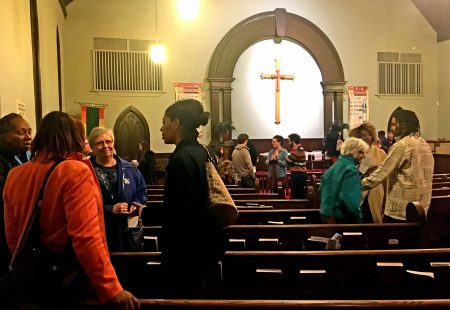
Greg Willams speaks about the Inside-Outside Alliance as the rest of the panel listens. (Left to Right) Laila Nur, Greg Williams, Magan Gonzales Thigpen, Henry McKoy, Melissa Norton, Matt Hartman. (Staff photo by Taylor Mabrey)
Durhamites came together last Wednesday at Calvary UMC for “Pushing Past Progressive: Ending Inequality in Durham” to discuss what is going on in the city. Representatives from five different organizations were there to speak on the issues at hand, and concerned community members were able to interact with them and hear about their projects.
Matt Hartman, co-chair of the Piedmont’s Democratic Socialists of America chapter, welcomed everyone and introduced the topics of the night. Certain questions like “How do we build a base of support?” and “How do we bridge together races?” were asked.

DeDreana Freeman speaks to the audience about coming together and getting to the root of the problems in Durham at Calvary UMC Wednesday night. (Staff photo by Taylor Mabrey)
The groups present were Durham For All, Durham People’s Alliance, Inside-Outside Alliance, Bull City 150 and the Durham Committee on the Affairs of Black People. To begin the discussion, Durham For All’s Laila Nur spoke about her organization’s current movement in the area.
Nur is the lead organizer for 10K Strong– the “cross-class, multiracial movement”– and she was passionate when explaining the movement’s goals and how they intend to bring Durham together through providing homes, education and sanctuary for all people.
Duke professor and faculty director of Bull City 150 Robert Korstad explained how his organization aims to create a broad, shared understanding of Durham’s history, and how this can be used to move forward.
“This history is meant to re-orient Durhamites,” Korstad said.
Korstad mentioned the housing inequality panels held by Bull City 150, and how they provoke real dialogue about this issue. He included that there are about 900 evictions per month in Durham, which is the highest number in the state.
“The issues are really very palpable here,” Korstad said.
Melissa Norton, project director of Bull City 150, presented a brief, yet meaningful timeline of Durham and the things that have pushed it to where it is today. She gave 10 lessons and a recap on the “ravages of racial capitalism,” ranging from stolen land all the way up to urban renewal and community organizing.
When the panel began, Hartman asked questions to various members at the table and gave them each an opportunity to answer and add to one another’s’ responses.
Before the discussions, panel members who had not yet introduced their organization gave a brief summary of who they were and what they do.

After the panel ended, conversations were sparked among the audience and they were able to share ideas and opinions. (Staff photo by Taylor Mabrey)
Henry McKoy spoke on behalf of the Durham Committee, which has been around since 1935 and includes many committees such as the youth committee, education committee and many more.
Magan Gonzales Thigpen from the Durham People’s Alliance spoke of the various projects the alliance is working on to better the community. Two mentioned were the “You Can Vote” project, which educates citizens on their right to vote and how to become a registered voter and the “Durham living wage” project, which works to urge employers to pay staff livable wages and recognizes the importance of living wages in the city.
Greg Williams of the Inside-Outside Alliance described what his organization does. This group works to fight issues within jails, mass incarceration and more.
Williams said their goal was to have “people on the inside dismantle the prisons.”
The Inside-Outside Alliance has a blog that anyone can visit to learn more about this.
As the panel discussion grew, each question and answer led to one big topic: gentrification in the area, and how to combat it.
“Organize, organize, organize, organize, folks,” Nur said.
McKoy pointed out the importance of how the community uses its incentives and resources to fight the growing problem.
Norton brought up the Durham Community Land Trust, which is a huge help in affordable housing. This program takes homes off the market permanently, which in turn keeps them affordable for generations to come. If this movement grew, the area can start to be taken back by the ones that have lived there for their whole lives.
“Markets move fast and policy moves slow,” Norton said.
When participatory budgeting came to the table, more great insights were given. Laila Nur and Henry McKoy emphasized the importance of more people participating in government spending.
Nur also pointed out that they specifically should focus on who is being invited to participate in this spending – poor, working black and brown people need to be in attendance.
The room was a supportive environment for those on the panel and when the audience was able to participate at the end, more important conversations were able to be had.
Questions from the audience provoked discussion about how not everyone in the community is being reached because so many organizations use social media to get the word out about events.
Not everyone in the area is able to receive these alerts, because they do not have access to social media. The places that are hurting the most are not being touched and these organizations promised to work harder to get their news out to each and every person in the community.
DeDreana Freeman, a new member on the Durham City Council, was able to speak further on behalf of the organizations and show her support and excitement for the community at the end of the discussions.
This event was packed with information and generated new motivation for the people of Durham. It showed that when people come together to discuss and hash things out, new perspectives are given and new insights are brought up to further push change.